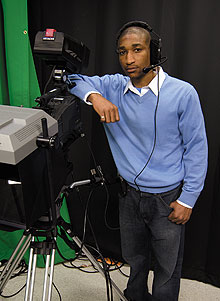  |
| HOME | THIS ISSUE | CALENDAR | GRANTS | BACK ISSUES | < BACK | NEXT > |
Individualized majors help students shape their undergraduate careers by Sherry Fisher - March 17, 2008 | ||||
| When Brandon Cardwell was a UConn freshman, he didn’t know what he wanted to study. “I had thought about studying business, but it wasn’t my best fit as a major,” says Cardwell, who was also interested in communication, music, and entertainment. Thanks to some good advice, it wasn’t long before he found himself meeting with Margaret Lamb, director of UConn’s Individualized Major Program. The program allows students to create their own plans of study. “When I told them I was one of the founding members of Husky Entertainment, [a student-run record label], and we talked about my other interests, we came up with the major “Mass media, popular culture, and entrepreneurship,” says Cardwell, who spent his first two years at UConn at the Stamford Campus. He also has two minors: communication sciences and business. “It has been perfect for me,” says Cardwell, who plans a career in television and music production. The individualized major program is available to undergraduates based in the Colleges of Liberal Arts & Sciences and Agriculture & Natural Resources. Acceptance into the program is based on submission of a formal proposal, and approval by faculty advisors and an admissions committee. Cardwell says the program has made his academic career relevant to his future goals. “It’s relevant and tailored to what I want to do,” he says. “Rather than go to a class, and wonder why I’m there, I’m going to class saying, ‘I need to know this; this is going to help me later on.’” His hands-on experience has included working as assistant production manager at WHUS, the student radio station, and working as advertising director for UCTV, the student-run television station. Currently, some 120 students are taking individualized majors, and each year, about 70 students graduate with an individualized major degree. Up to 200 faculty members are working as advisors with individual majors. “The program motivates students to take charge and shape their undergraduate careers,” says Lamb. “I’m very happy to see them doing it, whether it’s a stand-alone major or part of a double major program.” She says the program attracts highly motivated students. “Each of these students has an idea, is motivated to pull together a plan, and can convince others it’s a good one,” she says. “And they follow through. Individualized majors like creative challenges. The fact that their major doesn’t exist in traditional form is not a barrier; it’s an opportunity.” Lamb says students are asked to prepare statements of purpose that include writing about the importance of studying a particular subject. “For example, if a student wants to focus on international trade, it’s important to combine economics, some business administration, and political science courses,” she says. “They then need to think about how they are going to put theory into practice. Are they going to study abroad or do internships, and if so, where does that lead? If they’re planning on going to graduate school, what type of plan would fit? “We don’t tie them down to particular plans,” she adds, “but we help shape the way they frame the problems and challenges of their undergraduate education.”
Kathryn Strother Ratcliff, an assistant professor of sociology, advises students and serves on the individualized major board. “I encourage students to consider an individualized major if they have an interdisciplinary passion,” she says. “The program allows students to follow a passion, show intellectual initiative, and develop a student-centered curriculum.” Ratcliff says the program’s broad exposure “challenges students to see issues in their real world complexity, not limited by disciplinary boundaries.” Steve Wisensale, professor of human development and family studies, is also on the advisory board. “I think the program offers a wonderful opportunity for students who think beyond the traditional disciplinary boxes that exist at most universities,” he says. “The most impressive applications I’ve seen usually revolve around international relations. These students are quite skilled in seeking out the appropriate courses and pulling together a proposal that is coherent, interesting, and academically challenging for them.” He adds, “I always emphasize with each applicant the importance of finding and completing an outstanding internship or two. These become the real springboard for graduate school and/or their careers.” Katy Laguzza, a senior, has an individualized l major in puppetry and human rights. “The best part is being able to look at my college education and feel like I’ve received a good, well-rounded education, completely tailored to my interests.” Senior Billy Haubrich says, “I wanted the challenge of creating my own major and fulfilling the requirements that I would set for myself. I decided on Sport Promotion and the Media because I wanted to get involved in the field of sport communication. It also complemented my other major of communication sciences.” He says his advisors have been “extremely helpful throughout this process. Ever since my first visit, I have felt more like a family member than a student.” Haubrich has interned with two minor league baseball organizations in his home state of New Hampshire: Nashua Pride and the Concord Quarry Dogs. “They were great internships to gather experience,” he says. He is currently the media relations intern for the Travelers Championship, a PGA Tour event, where he is involved in researching, writing, and producing a media guide. He also handles some marketing, sales, and promotions. “Being involved with a professional sporting event is the best experience I could receive for my major,” he says. Haubrich adds, “The Individualized Major Program has really helped me to decide what I want to do after graduation. Before entering this program, I had no idea what life had in store for me.” |
| ADVANCE HOME UCONN HOME |

